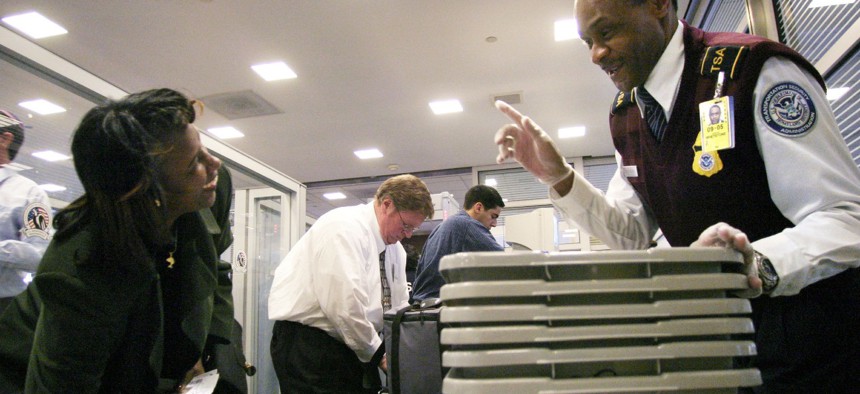
Bill O'Leary/The The Washington Post via Getty Images
Better Benefits for Families of Feds Who Die on the Job, and Better Pay for TSA Agents
A weekly roundup of pay and benefits news.
A Senate panel on Wednesday advanced bipartisan legislation that would increase the death benefits and funeral allowances for federal employees who die while on duty.
The Senate Homeland Security and Governmental Affairs Committee approved by voice vote the Honoring Civil Servants Killed in the Line of Duty Act (S. 3487). Introduced by Sens. Kyrsten Sinema, D-Ariz., and Rob Portman, R-Ohio, the bill provides the first increase to death benefits for survivors of federal employees who die on the job in more than 20 years, and the first improvement to funeral allowances in more than half a century.
The legislation increases death benefits payable to the family of a dead federal worker from $10,000 to $100,000, and increases the government’s coverage of funeral expenses from $800 to $8,800.
“These death benefits have not increased 1997, and funeral allowances have not been adjusted since 1966, so now is an appropriate time to update these benefits,” Portman said Wednesday.
The bill has the support of multiple federal employee groups, including the American Federation of Government Employees and the National Active and Retired Federal Employees Association.
“The loss of a parent can be catastrophic for many families facing housing, medical and educational expenses without a primary income earner,” wrote AFGE Legislative Director Julie Tippens, in a letter to the committee. “This much-needed bill expresses our nation’s gratitude for the civil servants we have lost, at the time their families most need support.”
The legislation now heads to the floor for consideration by the full Senate.
TSA Pay Equity a ‘Top Priority’
Transportation Security Administration Administrator David Pekoske said Monday that his top priority over the next year is to improve compensation of his workforce, which he said has lagged behind that of other civil servants.
When TSA was first founded following the September 11, 2001, terrorist attacks, Congress granted the agency the authority to develop its own personnel system that could change and adapt to evolving circumstances as a new organization.
But that led to the agency depriving its employees of the civil service protections enjoyed by most other federal workers and constructing a compensation system that pays entry-level airport screeners as little as $29,000 per year. As a result, TSA has suffered from some of the lowest morale in the federal government, according to the annual Federal Employee Viewpoint Survey, and consistent difficulties recruiting and retaining employees.
Last year, Homeland Security Secretary Alejandro Mayorkas instructed Pekoske to provide TSA employees the same civil service protections and collective bargaining rights guaranteed to Title 5 workers, and compensation equivalent to what TSA employees would receive if they were hired into the General Schedule pay system.
At an event hosted by the Government Technology and Services Coalition Monday, Pekoske said his top priority for the next year is improving his employees’ pay to align with other federal workers.
“If you compare their pay and our pay bands compared to what they would get in the General Schedule, like if you’re looking at a K Band employee as compared to a GS-15 or an E Band transportation security officer compared to a GS-7, there’s a significant discrepancy there that’s fundamentally unfair and we need to remedy it,” he said. “It affects us to a degree in our recruiting and it affects our retention, and it also affects the value our employees feel based on what they’re being compensated.”
Pekoske said his effort to increase pay across TSA has the support of Mayorkas, and he hopes that Congress will be supportive and fund the effort.







